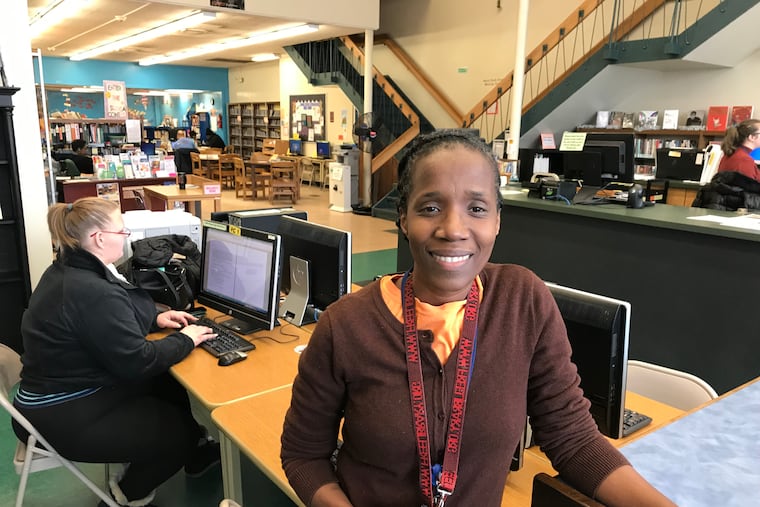The closure and delayed reopening of the Nicetown-Tioga Library have been devastating for the neighborhood
Since it closed in April, families have lost access to books and computers, job seekers have lost opportunities, and people in need of health care and emergency food have lost vital support.

On the morning of April 5, a brief earthquake rattled Philadelphia. For many, it was a fleeting reminder that we live near shifting tectonic plates. But for the Nicetown-Tioga neighborhood in North Philly, it was the start of a long saga that shut down our local library and community hub. More than six months later, we still don’t know when it will reopen.
Nicetown-Tioga Library, located at the intersection of North Broad Street and Erie and Germantown Avenues, was constructed around 1950. With its huge first-floor windows and concrete facade, it is a classic example of midcentury modern architecture. However, 70 years of deferred maintenance by the city have created hazardous building conditions, including unreliable electrical service and inadequate cooling and heating. Improvised support beams in the basement buttress the first floor.
After that Friday morning temblor, library staff called city officials to make sure it was safe for library patrons. The Department of Licenses and Inspections arrived later that day and ordered the library closed until a structural engineer could weigh in. To date, it has not reopened.
The closure has been devastating for our Nicetown-Tioga neighborhood.
Summer has come and gone, and we have no idea when our library will open its doors.
The library has long been one of the only community spots open to everyone. The building is located just a few doors south of the renowned Cadillac Club and across the street from the iconic Beury Building. Both institutions, like many others in the neighborhood, are now closed. But the neighborhood has always been able to rely on its library.
Until the earthquake, the library hosted free employment fairs, job trainings, health screenings, criminal record clearing clinics, adult basic literacy classes, after-school homework tutoring with meals, cooking and nutrition classes, and crochet classes. The library had just launched new computer classes, a weekly Scrabble and chess club, a filmmaking series, youth cooking programs, and a summer science program for students.
The library was the closest neighborhood branch to several elementary schools that do not have their own full-time libraries, including Kenderton, Mary McLeod Bethune, and Edward T. Steel Schools. It was also one of the few branches that was open on Saturdays.
“I am saddened that they keep putting our Nicetown-Tioga branch library on the back burner,” community member Lenise Miller told us. “Our children have no place to go to after school for programs and resources and to keep them off the streets.”
In June, over 50 community members met with the leadership of the Free Library of Philadelphia at Community Legal Services to advocate for reopening our branch. Community Legal Services, where one of us works, has had a neighborhood law office at Broad and Erie for 50 years, and our clients have told us how transformative the library’s services have been in their lives. At this meeting, we were assured leadership was taking the closure seriously. A month later, in July, an even larger number of residents spoke up at a meeting at Zion Baptist Church. The library leadership promised us that the library would reopen by July 12.
Summer has come and gone, and we have no idea when our library will open its doors.
Nicetown-Tioga is not alone. Twenty library branches were closed this summer because of inadequate air-conditioning. Additionally, Pew recently studied how the city spent its capital budget on facilities like libraries, recreation centers, and parks. From 2011 to 2022, the city spent $898 per person in neighborhoods with the smallest share of Black residents, but only $507 in neighborhoods with the greatest share of Black residents. Ninety-three percent of Nicetown-Tioga residents identify as Black or Latino.
The closure of Nicetown-Tioga Library is an example of what happens when a city does not invest in and maintain its libraries and public spaces. Although Rebuild, a program started by Mayor Jim Kenney, will eventually make necessary renovations, families are losing access to books and computers now. Job seekers are losing opportunities now. People in need of health care and emergency food are losing vital support now.
And a neighborhood is losing a critical center of activity.
Amelia Price is the corridor manager for the intersection of North Broad Street and Erie and Germantown Avenues for Called to Serve. Based at Zion Baptist Church, Called to Serve has worked in the neighborhood since 2014. Michael Froehlich is the managing attorney of Community Legal Services’ Homeownership and Consumer Rights Unit and works in CLS’s North Philadelphia office.